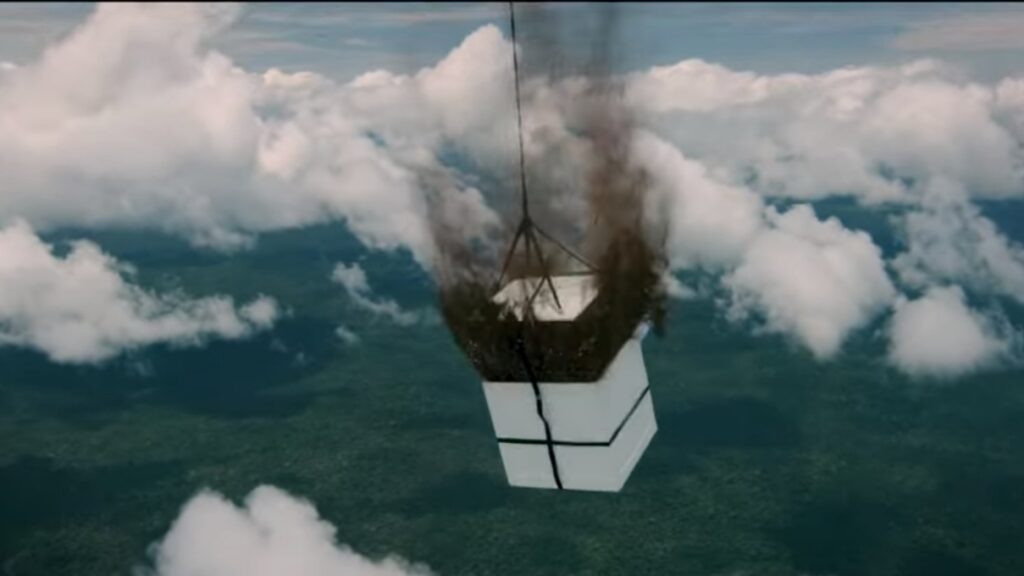In a historic feat wherein components of innovation, an adventurous spirit, and a dedication towards environmental conservation were combined, famous skydiver Luigi Cani released 100 million native seeds across the Brazilian Amazon. This noteworthy journey opened doors to wide-scale reforestation and flora and fauna conservation.

The 11-time world record holder, with multiple accolades and 22 years of professional diving under his belt, undertook the groundbreaking initiative to once and for all address the rapid deforestation of the Brazilian Amazon, which reached an all-time high in the first half of 2022. The diver and his team meticulously selected 27 different types of native seeds. Then, they spread over 100 million of them across the 38-square-mile area of land affected most by the deforestation.
This noteworthy initiative was powered by the support of Audi do Brasil. The expected restoration and reforestation of the Amazon rainforest has the potential to completely remediate the health of the rainforest. The effects will come into visible fruition in the next 2 years
“It was the only jump in my life that I held my breath the entire time. My heart was beating really fast. I felt like I was going to have a heart attack,” the Brazilian skydiver told the media.
Get to know the revolutionary
Luigi Cani, born December 4, 1970, is a renowned Brazilian skydiver, stunt performer, and cinematographic producer. As one of the world’s best-known aerial athletes, his groundbreaking projects have been broadcast on more than 60 television channels across the globe. Cani has performed over 13,000 training jumps and holds multiple world records. The most renowned is his record of landing with the smallest and fastest parachute on the planet.

Indeed, these wide-ranging accolades are enough to propel the athlete into worldwide fame; yet he continued to exceed all expectations as he turned his athletic proficiency towards an environmentally conscious endeavour.
In a daring feat, the skydiver and his team composed an extensive plan to target the most deforested area of one of the most crucial pillars of the Brazilian ecosystem; the Brazilian Amazon Rainforest. Through his bird-view frame of reference, Cani recognised the dire situation and pioneered an inventive method to target the issue: scattering 100 million native seeds at precisely 6,500 feet over the region.
5-year planning of the reforestation project
In January 2023, the diver leapt from a plane flying over the severely deforested region of the Brazilian Amazon. He carried 100 million seeds of 27 different native varieties. Scattered evenly through the air pressure and wind, the seeds have a germination rate of 95%. The trees can reach 50 metres in height.

Despite Cani’s adventurous background, this initiative was not hurried or inattentive. Cani and his team went through five years of painstaking planning to make this restoration dream come true. They had multiple hurdles to cross, the first of which was obtaining permits from the Brazilian government to carry out this task. Through much trial and error, they also constructed a biodegradable box that would properly scatter the seeds across the region.
“We have gone through a very exhaustive process to bring together all the tools capable of making this action possible. There is no better feeling than the moment we touch the ground again and we know that everything has gone well,” said Luigi Cani.
The seeds were specially selected from a nearby rainforest to suit over 60,000 plant species found in the Amazon rainforest. Their germination rate was the most important factor, as they will be dispersed from a considerable height. The cultivation of the seeds took nearly two months.
They also had to transport the film crew and approximately 3.5 tonnes of equipment into the rainforest. Cani’s team went through multiple box tests before the leap, of which three failed.
“We were running out of time,” says Cani. “We stayed up all night trying to find a way to seal a leak in the box.”
As one would expect, Cani was under immense pressure on the day of the jump; he had to ensure that he maintained a stable grip on the box to discharge the seeds appropriately.
“I struggled to hold the box and nearly broke my wrist and fingers. I managed to stabilise myself at about 6,000ft [1,800 m], and the seeds were released precisely where we wanted them to be. It was complete ecstasy.”
Cani’s rightful concern for the Amazon deforestation
With this mission, Cani formed a meeting point for his two different domains: an adventurer’s spirit and a humanitarian’s ecological consciousness. The environmental advocacy might not have been a shock to many who were aware of the shocking Amazon rainforest wildfires. These fires spread continuously through much of 2019. Though fires can be common during the dry season, the increasing rate of fire counts has led to international concern over the fate of the rainforest.

In 2022, the rainforest saw another impediment as a high record of deforestation arose. In the first half of the year, deforestation claimed roughly 1,500 square miles of the Amazon rainforest. This area was roughly five times the size of New York City. According to the Brazilian Space Agency, this was greatest loss since 2016.
Further, the data showed that in June 2022, the number of wildfires burning in the Amazon hit a 15-year high. Evidently, this was a concerning number as fires typically peak in August and September.
“Agribusiness is hitting new records for forest destruction as the dry season arrives in the Amazon. If this trend does not change, we will approach the tipping point of no return, at which the Amazon could fail as a rainforest,” Cristiane Mazzetti, a spokesperson for Greenpeace Brazil, said in a statement in 2022 regarding the state of the rainforest.
The rewarding repercussions of 100 million seeds
Through this strategic reforestation, Cani provides a hopeful future for the rainforest. The dispersion will help in balancing the carbon dioxide levels in the atmosphere, promote oxygen production to support the flora and fauna, encourage biodiversity, and alleviate climate change.
The innovative idea works on a large scale and removes the tedious process of hours of manual labour required to cover a small percentage of the rainforest with seeds. The process of dispersing the seeds at high altitude eliminates the labour-intensive process of plantations and promises a swifter recovery for the rainforest.

Additionally, the importance of this initiative does not stop at simply planting trees. The wide forestation gives rise to multiple ‘ecological ripple effects’ that aid the forest further. The germinating plants lead to soil stabilisation. This process allows the soil to hold onto nutrients effectively and remain rich and fertile for a long time. It also eliminates the risk of soil erosion.
Another thing that usually accompanies a forest on the brink of extinction is the gradual rise of endangered wildlife. The reforestation ensures shelter for a variety of flora and fauna found in the rainforest, along with the potential to enhance the complex biodiversity. With the rising plants, the reforested area becomes a fresh carbon sink, absorbing carbon dioxide from the atmosphere and storing it in its biomass. This will help eliminate greenhouse gases and stabilise climate change.
Why is the selection of native seeds an important step?
The use of native plant seeds is essential for the success of any reforestation project. Native plants are those that have evolved naturally in a particular region and have adapted to the local climate, soil conditions, and wildlife. As a result, they are more likely to survive and thrive than non-native plants.
To ensure the best outcome of this journey, Cani released native seeds to jumpstart the process of natural regeneration, hoping to encourage the revival of plant life and the ecosystems it sustains. As these plants form a symbiotic relationship with the ecosystem, they adapt to the soil conditions, rainfall patterns, and temperature fluctuations. In a deforested area, they have a higher chance of survival and attract a large number of wildlife.
A meaningful impact and future prospects
With the growing tension surrounding the degrading state of our natural resources, the introduction of 100 million plants is an important step towards an optimistic future. The combination of an adventurous activity like skydiving with the environmentally conscious drive of reforestation serves as an informative leap that encourages people worldwide to take part in saving the climate. While not everyone can save the environment by diving from a plane, this project shows how people can partake in this endeavour through any skills and means available to them.

Even for Cani, this project was not the grand end but the hopeful beginning of more environmentally friendly endeavours. His next project, combining skydiving with clearing harmful plastics from polluted oceans, is already underway.
“I’ve been jumping for 25 years, and I’ve always pushed the limits with risky jumps. Now, I’m 51 years old and I don’t have that drive for danger any more. I want to do something to help. Like the seed drop, this next project will have real meaning behind it,” said Luigi Cani regarding his future prospects.

